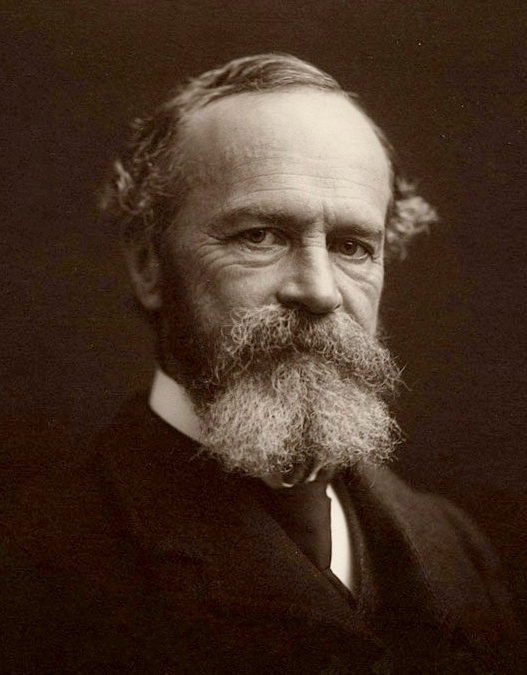William James Berühmte Zitate
„Ein Ding ist dann wichtig, wenn irgendjemand denkt, dass es wichtig ist.“
Die Prinzipien der Psychologie
Die religiöse Erfahrung in ihrer Mannigfaltigkeit
„Genie ist in Wahrheit kaum mehr als die Fähigkeit, auf ungewöhnliche Weise wahrzunehmen.“
Die Prinzipien der Psychologie
Die Prinzipien der Psychologie
„Eine Idee, die anregen soll, muss zu dem Einzelnen kommen mit der Wucht einer Offenbarung.“
Die religiöse Erfahrung in ihrer Mannigfaltikeit
Brief aus dem Jahr 1904, in: C.Stumpf: William James nach seinen Briefen. Leben, Charakter, Lehre, Berlin 1928, S. 17
William James: Zitate auf Englisch
"Preface"
1910s, Talks to Teachers on Psychology and to Students on Some of Life's Ideals (1911)
“All our scientific and philosophic ideals are altars to unknown gods.”
Lecture at the Harvard Divinity School (13 March 1884); published in the The Unitarian Review and Religious Magazine as The Dilemma of Determinism http://books.google.com/books?id=38DVAAAAMAAJ&q=%22All+our+scientific+and+philosophic+ideals+are+altars+to+unknown+gods%22&pg=PA196#v=onepage (September 1884)
1880s
“A difference which makes no difference is no difference at all.”
As quoted in William James: The Essential Writings (1971), edited by Bruce W. Wilshire, p. xiii
1900s
The Moral Equivalent of War http://www.constitution.org/wj/meow.htm
1910s, Memories and Studies (1911)
The Social Value of the College-Bred http://www.des.emory.edu/mfp/jaCollegeBred.html
1910s, Memories and Studies (1911)
Reported in Dictionary of Burning Words of Brilliant Writers (1895) edited by Josiah Hotchkiss Gilbert, p. 225
1880s
Lecture XX, "Conclusions"
1900s, The Varieties of Religious Experience (1902)
The Dilemma of Determinism (1884) p.153
1880s
The Will to Believe http://infomotions.com/etexts/philosophy/1800-1899/james-will-751.htm (1897)
1890s
Quelle: 1890s, The Principles of Psychology (1890), Ch. 9
"What Makes a Life Significant?"
1910s, Talks to Teachers on Psychology and to Students on Some of Life's Ideals (1911)
"Is Life Worth Living?"
1890s, The Will to Believe and Other Essays in Popular Philosophy (1897)
“Tell him to live by yes and no — yes to everything good, no to everything bad.”
As quoted in The Thought and Character of William James (1935) by Ralph Barton Perry, Vol. II, ch. 91
1890s
1900s, The Moral Equivalent of War (1906)
The Dilemma of Determinism (1884)
1880s
“I myself believe that the evidence for God lies primarily in inner personal experiences.”
Lecture III, Some Metaphysical Problems Pragmatically Considered
1900s, Pragmatism: A New Name for Some Old Ways of Thinking (1907)
"Reflex Action and Theism"
1890s, The Will to Believe and Other Essays in Popular Philosophy (1897)
“The trail of the human serpent is thus over everything.”
Lecture II, What Pragmatism Means
1900s, Pragmatism: A New Name for Some Old Ways of Thinking (1907)
Quelle: 1890s, The Principles of Psychology (1890), Ch. 4
The Social Value of the College-Bred
1910s, Memories and Studies (1911)
Quelle: 1890s, The Principles of Psychology (1890), Ch. 15
Lectures XI, XII, and XIII, "Saintliness"
1900s, The Varieties of Religious Experience (1902)
Quelle: 1890s, The Principles of Psychology (1890), Ch. 8
Lecture VI, Pragmatism's Conception of Truth
1900s, Pragmatism: A New Name for Some Old Ways of Thinking (1907)
Variante: Habit is thus the enormous flywheel of society, its most precious conservation agent. It alone is what keeps us all within the bounds of ordinance, and saves the children of fortune from the envious uprisings of the poor.
Quelle: 1890s, The Principles of Psychology (1890), Ch. 4
"Man alone, of all creatures of earth, can change his thought pattern and become the architect of his destiny." Actually said by Spencer W. Kimball, twelfth president of The Church of Jesus Christ of Latter-day Saints, in his Miracle of Forgiveness (1969), p. 114. This predates any of the misquotations.
Other forms: "The greatest discovery of my generation is that human beings can alter their lives by altering their attitudes of mind." This is also misattributed to Albert Schweitzer.
James did say: "As life goes on, there is a constant change of our interests, and a consequent change of place in our systems of ideas, from more central to more peripheral, and from more peripheral to more central parts of consciousness."
Misattributed
To H. G. Wells (11 September 1906)
1920s, The Letters of William James (1920)
Lecture I, "Religion and Neurology"
1900s, The Varieties of Religious Experience (1902)
